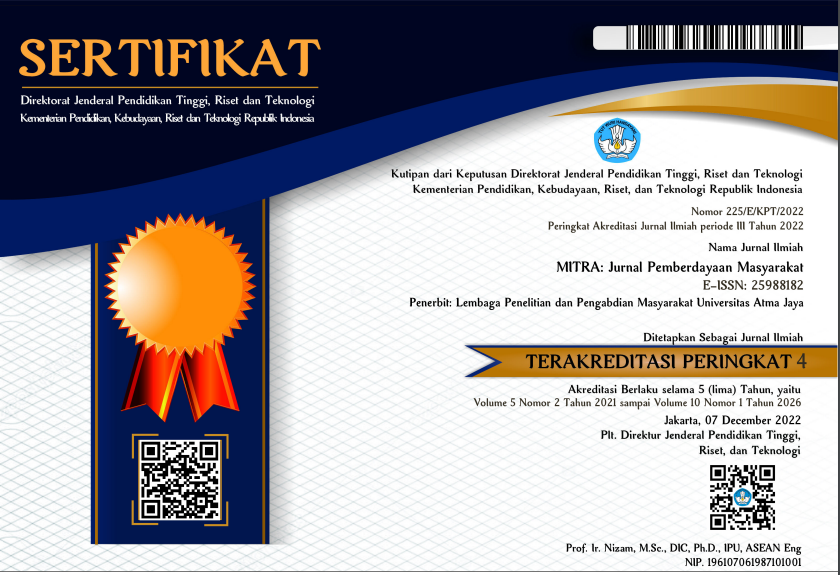Towards Green Rusunawa: Clean Water Utilization, Composting, and Urban Farming in Muara Baru Flats
DOI:
https://doi.org/10.25170/mitra.v5i1.1077Kata Kunci:
compost, clean water utilization, urban farming, Muara Baru flatsAbstrak
Waste disposal and clean water management are some of the common social issues arising in densely populated settlements, including Muara Baru flats, Jakarta. Some programs have been carried out to overcome these two issues in Muara Baru, such as the construction of a Rain Water Harvesting (RWH) facility and the provision of Trash Banks. Nevertheless, adequate support for the residents is still needed to boost their awareness of proper clean water management and waste disposal and to encourage the formation of urban agriculture, which is expected to elevate their living standards. Therefore, a community empowerment program in Muara Baru was developed, consisting of three sections: education on clean water management, compost making training, and urban farming. The success of this program was then measured using questionnaires and focus group discussions. A majority of residents responded positively to the program and were willing to actively participate by preparing the land, making compost, planting seeds, or caring for the harvest. There were indeed some obstacles hampering the program's success, such as lack of commitment from the local community, climate change, water availability, and arable land availability. To overcome these barriers and to promote the program’s sustainability, some suggestions are to be proposed, including proper selections of plant types and provision of support and motivation for the local community.
Referensi
Arriani, R. R., & Rahdriawan, M. (2019). Partisipasi masyarakat dalam program pertanian perkotaan pada penghuni Rumah Susun Marunda, Jakarta Utara. Teknik PWK (Perencanaan Wilayah Kota), 8(3), 134–147.
Getachew, D., Tekie, H., Gebre-Michael, T., Balkew, M., & Mesfin, A. (2015). Breeding sites of aedes aegypti: Potential dengue vectors in dire Dawa, east Ethiopia. Interdisciplinary Perspectives on Infectious Diseases, 2015.
https://doi.org/10.1155/2015/706276.
Palyja. (2017). PAM Lyonnaise Jaya – Perkembangan jaringan pipa baru PALYJA untuk Jakarta Utara. http://palyja.co.id/en/latest-news-list/perkembangan-jaringan-pipabaru-palyja-untuk-jakarta-utara-3/.
Soebijoto, H. (2017). Penghuni Rusunawa Muara Baru : Airnya burem, butek dan mengeluarkan bau busuk. https://wartakota.tribunnews.com/2017/08/22/penghunirusunawa-muara-baru-airnya-birem-butek-dan-mengeluarkan-bau-busuk.
Suparwoko, & Taufani, B. (2017). Urban farming construction model on the vertical building envelope to support the green buildings development in Sleman, Indonesia. Procedia Engineering, 171, 258–264. https://doi.org/10.1016/j.proeng.2017.01.333.
Syafruddin, Suluk, & Saidah. (2015). Perbaikan pola tanam palawija pada lahan kering di Kabupaten Parigi Moutong Sulawesi Tengah. Jurnal Pengkajian dan Pengembangan Teknologi Pertanian, 18(3), 263–272.
https://doi.org/10.21082/JPPTP.V18N3.2015.P%P.
UAJ. (2017). Pusat Pemberdayaan Masyarakat (PPM) Unika Atma Jaya Realisasikan Program Green Rusunawa.
https://www.atmajaya.ac.id/web/Konten.aspx?gid=highlight&cid=Pusat-Pemberdayaan-Masyarakat-PPM-Unika-Atma-Jaya-Realisasikan-Program-Green-Rusunawa.
Warjoto, R. E., Canti, M., & Hartanti, A. T. (2018). Metode komposting takakura untuk pengolahan sampah organik rumah tangga di Cisauk, Tangerang. Jurnal Perkotaan,10(2), 76–90. https://doi.org/10.25170/perkotaan.v10i2.306.
Wijayanti, S. H., Pandia, W. S. S., & Sutarno, H. Y. (2019). The concept of Green Rusunawa for the urban community in Indonesia. ASEAN Journal of Community Engagement,3(2), 12–31. https://doi.org/10.7454/ajce.v3i2.1061.
Unduhan
Diterbitkan
Cara Mengutip
Terbitan
Bagian
Lisensi
This license allows reusers to distribute, remix, adapt, and build upon the material in any medium or format for noncommercial purposes only, and only so long as attribution is given to the creator. If you remix, adapt, or build upon the material, you must license the modified material under identical terms.







_.jpeg)




.png)
2.png)
.png)
.png)



